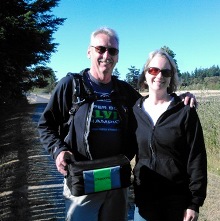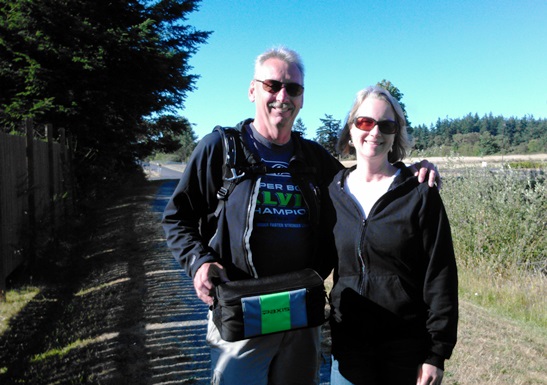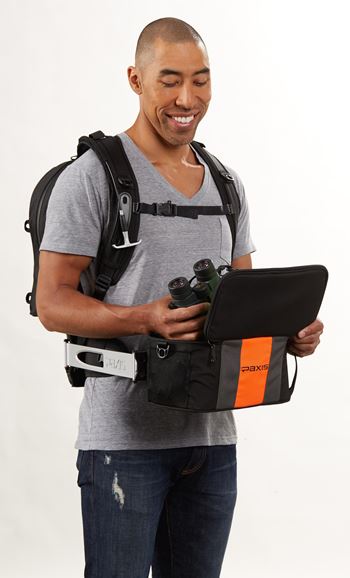— by Margie Doyle —
Long-time islanders Paul and Cathy Vierthaler — excavator, bookkeeper, entrepreneurs and business-builders and parents of two adult sons — are avid day-hikers. One day on a hike, Paul expressed the recurring frustration that he couldn’t get to water, gloves, or whatever he may have packed without taking off the backpack or “having me rummage through it,” says Cathy.
She encouraged her husband, “You always have great ideas.. . why don’t you think of something?”
And in short order, he had invented the unique swing mechanism for backpacks, a hinge that brings the lower portion of the pack from the hiker’s back to right in front of him. With a little welding, he devised a child’s backpack with the mechanism and found “It actually works!” and so he had his prototype.
With Cathy’s head for research and business, they found an engineer and manufacturer who could produce the packs, and invested in the patent process. It took over three years, but they now own the patent and have contracted with the manufacturer in China to build the packs.
Paul and Cathy handle the distribution from an office at the Airport Center to customers all across the U.S. and in Asia. Their next target is the European market. “It’s taken on a life of its own,” says Cathy. “We both work on it evenings and weekends.”
The swing-arm backpack is currently available at Orcas Outfitters in two sizes, for $265 and $275.
The name Paxis is a hybrid of “Pack” and “Access” and also “Axis,” referring to the signature rotating hinge of the product. They had tried a different trademark name but found it wasn’t available.
Paul Vierthaler says, “Probably the greatest challenge is that there’s been one challenge after another, after another, from design to the patent process to manufacturing, to relating my ideas across the globe to someone trying to manufacture something I’ve built.”
Cathy says “So much goes into research and development. A lot of brainstorming is involved. We’ve gone through four or five versions of what we want. Special tools have to be made to produce the metal and plastic parts.
“It’s taken us over three and half years to get delivery of the first product. And the patent process is expensive, in the $25,000 range over three years.”
There were also some pleasant surprises in the process. ” We found it’s no more expensive to ship things from Orcas than from the mainland, for example, from Mt. Vernon. We expected delivery rates to be higher but they’re not — that was a nice surprise.”
She doesn’t have a moment’s hesitation when asked if she’d be willing to share her knowledge and experiences with other inventors, designers and marketers. “I enjoy those aspects of the business, and I love starting businesses.
“I’d be more than happy to talk with people who want to go on that path. I always support entrepreneurs and am glad to help people get from point A to point B.” She’ll respond to emails sent to Cathy@paxispax.com .
As the distribution takes off, the Vierthalers say they’re really hoping to make this an island business. Paul adds, “The greatest kick will come when I see someone that I don’t know walking down the road wearing the pack. And it’s all due to Cathy challenging me. I’m a person that’s full of pet peeves, and that’s what started the whole thing, not being able to get something out of my pack.
“I guess that’s how people invent things or come up with ideas, out of frustration. Lots of people come up with great ideas all the time but never do something about it, never follow through.
“But it’s doable.”
They expected their market to be hikers like themselves, and they’re amazed at the other markets they didn’t anticipate — photographers, fly fishermen, and first responders, among others. They have made a special model for emergency responders with a reflective cross on it. And at an outdoor show in Salt Lake City, Cathy estimates 20 to 25% of those interested in Paxis were in military or first responder careers.
The couple will spend five weeks this year marketing Paxis at trade shows. “I didn’t expect to like the trade show circuit,” says Cathy, “I’m not a sales-type person, but I’ve found I like the traveling and meeting new people.”
Paul says, “We have a whole new unexplored learning curve ahead of us. “
**If you are reading theOrcasonian for free, thank your fellow islanders. If you would like to support theOrcasonian CLICK HERE to set your modestly-priced, voluntary subscription. Otherwise, no worries; we’re happy to share with you.**











How totally totally cool! An exciting new business, hopefully based on the Island. CONGRATULATIONS! Chamber of Commerce, are you listening? Merry
WOW!! Nice going, Paul and Cathy!! Best wishes for years of success!!
Thank you all for the kind words,
All the best,
Paul
Sorry, yes we are based on Orcas.
Thanks again.